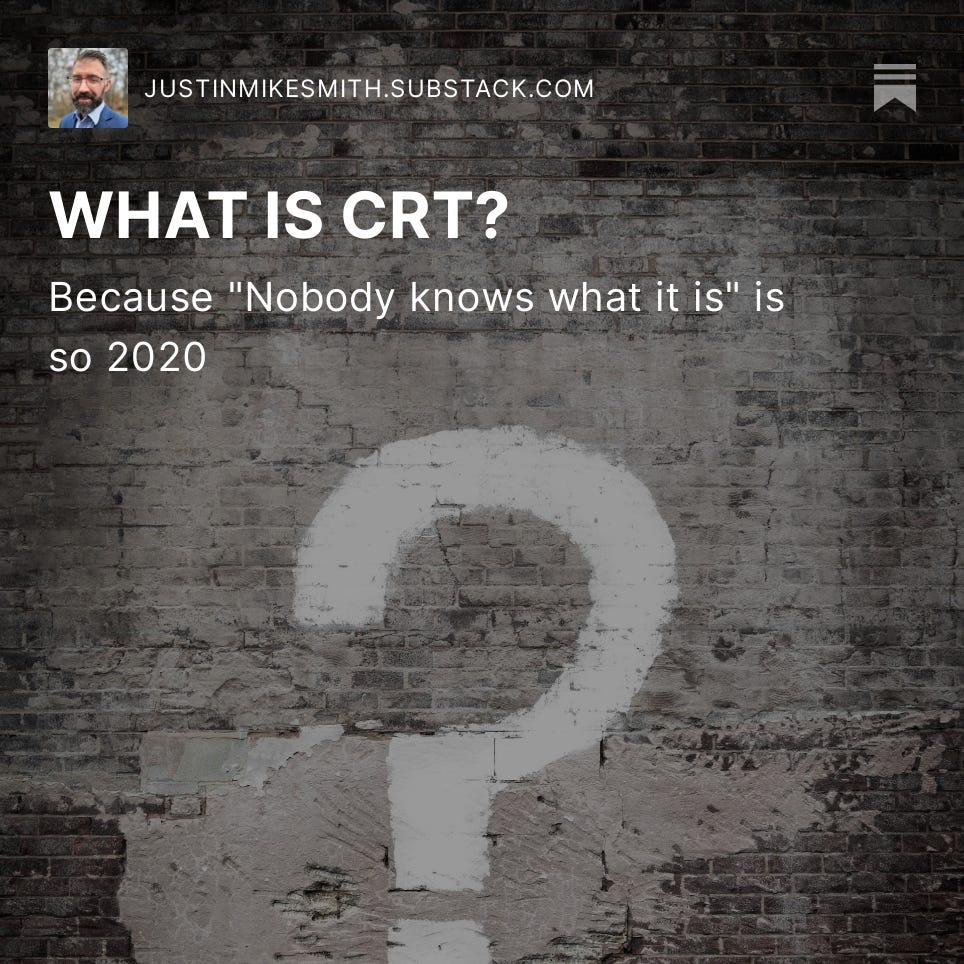Critical Race Theory (CRT) is a race-based epistemology1, meaning everything we know and think we know is rooted in racism. It developed out of a frustration with the slow results of the Civil Rights Movement to produce equal outcomes for POC2, and the insistence that racism became hidden in society rather than going away. As an outgrowth of critical legal studies, CRT has been shaped also by such ideologies as neo-Marxism, radical feminism, postmodernism and more.3
No longer a niche study in law schools (and don’t believe anyone who tells you it still is), the reach of CRT has spread across all our society4 with a powerful and polarizing effect. Battles rage over the implementation of CRT teachings in government, military, public schools K-12, universities, businesses, non-profits, churches.
While no single definition of CRT exists5, the fundamental ideas that every CRT scholar agrees on include6:
racism is about systems and not merely individuals;
racism is everywhere and explains all disparate outcomes between racial groups;
our founding and success as a nation depended on racism;
racism is hidden and camouflaged by liberal ideas like meritocracy, neutrality, rights, individualism, color-blindness;
the voices of marginalized people must be centered so their stories, lived experiences and knowledges can have more influence;
white people will only help black people when it serves their white interests (called “interest convergence”);
race is a social construct not rooted in biology;
America’s history must be retold by Critical Race Theorists;
fighting racism requires fighting other forms of oppression like sexism, classism, homophobia, etc.
As I said no universal one-sentence definition for CRT exists. But it doesn’t mean we shouldn’t try. For the hat, here’s how I’d sum CRT up in one sentence:
“CRT believes racism defines and explains our entire society, that we are not understanding our society unless we see how it is shaped by racism, and our response is to look for racism everywhere to expose and eliminate it.”
A person adopting CRT merely as an ‘analytical framework’ (cough *SBC* cough) to see society is ignorant or worse. CRT is both analytical and activist.7
“I define CRT… as a theoretical and analytical framework that challenges the ways race and racism impact educational structures, practices, and discourses. CRT is conceived as a social justice project that works toward the liberatory potential….”8
In CRT there is no concept of identifying where racism is occurring (analytical) but then refusing to do anything about it (activism). The moral obligation becomes “doing the work” of antiracism to dismantle the systems that produce racial inequality. As Marx said, “The philosophers have hitherto only interpreted the world in various ways. The point, however, is to change it.”
By Justin Smith
References
Harper, S. R., Patton, L. D., & Wooden, O. S. (2009). Access and equity for African American students in higher education: A critical race historical analysis of policy efforts. Journal of Higher Education, 80(4), p390; Tara J. Yosso (2005) Whose culture has capital? A critical race theory discussion of community cultural wealth, Race Ethnicity and Education, 8:1, p69-70.
Yosso, 72; Delgado, R. Stefancic, J. (2017). Critical Race Theory: An Introduction. New York University Press. (4-5)
Yosso, 71-72; Delgado, Stefancic, 5
Delgado, Stefancic, 7
Delgado, Stefancic, 8; Harper, Patton, Wooden, 390; George, J. (2021, Jan 1). A Lesson On Critical Race Theory. American Bar Association. https://www.americanbar.org/groups/crsj/publications/human_rights_magazine_home/civil-rights-reimagining-policing/a-lesson-on-critical-race-theory/
Delgado, Stefancic, 8-11; Harper, Patton, Wooden, 390-392; Yosso, 73-75
Yosso, 74; consider phrases like “Do the work” and “progress has been made but there’s much work still to do.” Robin D’Angelo says in her book White Fragility, “Naming white supremacy…shifts the locus of change onto white people, where it belongs. It also points us in the direction of the lifelong work that is uniquely ours…” (emphasis mine ), 33
Yosso, 74


